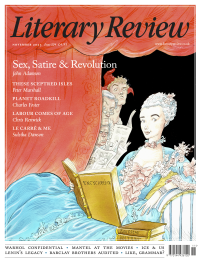Brendan Simms
The Kalashnikov & the Drone
Conflict: The Evolution of Warfare from 1945 to Ukraine
By David Petraeus and Andrew Roberts
William Collins 554pp £26
The jacket of this stimulating new book on the evolution of warfare since 1945 encapsulates the two ends of the spectrum in modern conflict. The top half depicts a Kalashnikov, the rifle of choice for many armies and most guerrilla groups. Easy to produce and maintain, it has been responsible for more deaths than any other weapon. The lower part of the jacket shows a drone. Unmanned aerial vehicles are very complex machines which have become ubiquitous over the past two decades. They are now as central to modern warfare as the Kalashnikov.
In David Petraeus and Andrew Roberts we have two expert guides to the subject. The former is a retired US general who has reflected intelligently on his service in Iraq, Afghanistan and other battlefields. His two fascinating chapters on the ‘War on Terror’ are written in the first person and are as much memoir as historical analysis. The latter is a very prominent political and military historian who has researched and thought about most of the conflicts that Britain and America have been involved in over the past 150 years or so. Wisely, the authors do not attempt to cover everything but provide instead a selective narrative with a strong thematic spine.
Much of the book is taken up with complex emergencies, especially the Western defeats in Vietnam and Afghanistan, the victory in Malaya and the stalemate in Iraq. Conventional warfare also gets its due. This has generally, but not always, been a
happier story for the West. The authors take

Sign Up to our newsletter
Receive free articles, highlights from the archive, news, details of prizes, and much more.@Lit_Review
Follow Literary Review on Twitter
Twitter Feed
‘The Second World War was won in Oxford. Discuss.’
@RankinNick gives the question his best shot.
Nicholas Rankin - We Shall Fight in the Buttery
Nicholas Rankin: We Shall Fight in the Buttery - Oxford’s War 1939–1945 by Ashley Jackson
literaryreview.co.uk
For the first time, all of Sylvia Plath’s surviving prose, a massive body of stories, articles, reviews and letters, has been gathered together in a single volume.
@FionaRSampson sifts it for evidence of how the young Sylvia became Sylvia Plath.
Fiona Sampson - Changed in a Minute
Fiona Sampson: Changed in a Minute - The Collected Prose of Sylvia Plath by Peter K Steinberg (ed)
literaryreview.co.uk
The ruling class has lost its sprezzatura.
On porky rolodexes and the persistence of elite reproduction, for the @Lit_Review: